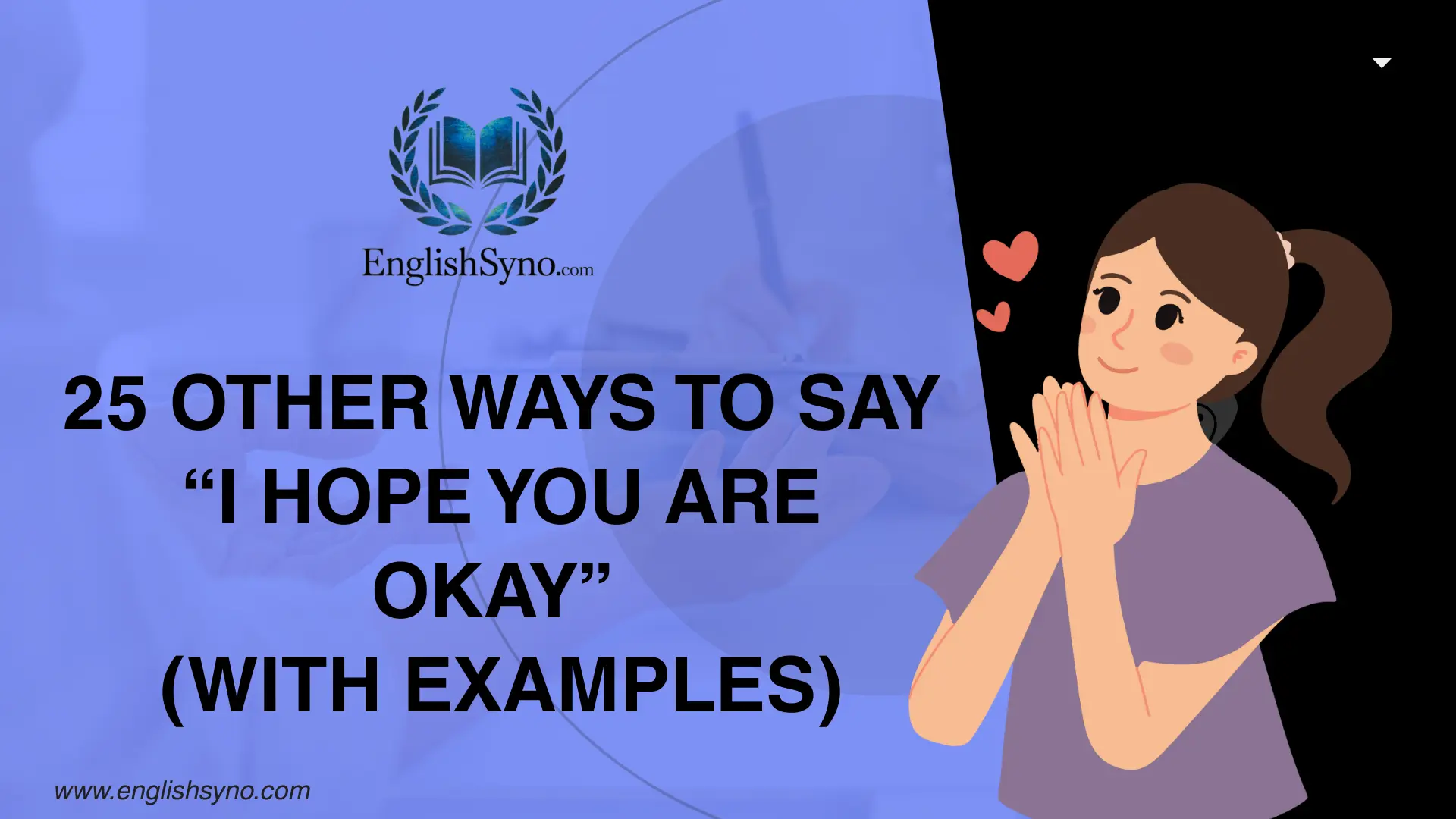Saying I hope you are okay naturally expresses concern and genuine care for someone’s well-being, including physical, mental, or circumstantial health, and can initiate a meaningful conversation after a period of no contact in situations where you suspect a difficult time, all while maintaining a positive, caring tone.
This friendly greeting or closing in emails, texts, or in-person conversations allows you to show support to colleagues, clients, or others you interact with differently, depending on the situation. Using alternatives to simply asking about someone’s day helps you express empathy in a professional context through messages, emails, or texts.
A simple email opener can be formal or informal, polite, and best suited for correspondents with a previously established relationship, ensuring a personal, appropriate tone that builds trust and makes the recipient feel genuinely seen and supported.
What Does “I hope you are okay” Mean?
“I hope you are okay” is a friendly, empathetic phrase used to express concern for someone’s well-being, including their physical, mental, or emotional health. It is often used to initiate conversation, show support, or check in after a period of no contact.
When to Use “I hope you are okay”
Use this phrase when:
- You want to show genuine concern
- Someone has been through a difficult time
- You are following up after a period of no contact
- You want to initiate a caring conversation
Is It Professional/Polite to say “I hope you are okay”?
Yes, it is generally polite and can be professional depending on the context. For colleagues, clients, or acquaintances, pairing it with neutral or supportive language makes it appropriate.
Pros or Cons
Pros:
- Shows empathy and concern
- Creates a friendly and supportive tone
- Strengthens relationships
Cons:
- May feel too casual in very formal situations
- Could be misinterpreted if overused
I’m thinking of you
Meaning/Definition: A warm, personal way to convey concern and let someone know they are in your thoughts.
Detailed Explanation: More personal than “I hope you are okay,” suitable for both casual and professional contexts with established relationships.
Example:
“Hi Emma, I’m thinking of you and hope everything is going well at home.”
Best Use: Personal emails, texts, or messages.
Worst Use: Highly formal communication.
Tone: Warm, caring, empathetic.
I hope everything is going well
Meaning/Definition: A polite and professional alternative expressing goodwill without assuming anything negative.
Detailed Explanation: Suitable for professional check-ins or casual updates.
Example:
“Hello Mark, I hope everything is going well with your new project.”
Best Use: Professional emails or messages.
Worst Use: Personal crises requiring empathy.
Tone: Neutral, polite, supportive.
I hope you’re having a good day
Meaning/Definition: Casual, friendly phrase conveying positivity and well-wishes.
Detailed Explanation: Perfect for lighthearted informal communication.
Example:
“Hey Lisa, I hope you’re having a good day so far!”
Best Use: Informal emails or texts.
Worst Use: Serious situations.
Tone: Friendly, upbeat, positive.
Sending you positive thoughts
Meaning/Definition: Expresses support and encouragement during challenging times.
Detailed Explanation: Works well when the recipient is facing stress or uncertainty.
Example:
“Dear Sam, sending you positive thoughts as you prepare for the presentation.”
Best Use: Supportive professional or personal messages.
Worst Use: Casual check-ins without context.
Tone: Encouraging, thoughtful, empathetic.
I hope you’re feeling better
Meaning/Definition: Focused on well-being, particularly after illness or hardship.
Detailed Explanation: Directly acknowledges that the person may have been unwell.
Example:
“Hi Anna, I hope you’re feeling better after being sick last week.”
Best Use: Personal messages, caring emails.
Worst Use: Generic greetings to healthy people.
Tone: Caring, empathetic, supportive.
Just checking in
Meaning/Definition: A casual way to express concern and show attentiveness.
Detailed Explanation: Encourages dialogue without assuming anything negative.
Example:
“Hi Tom, just checking in to see how your new role is going.”
Best Use: Quick emails or texts to colleagues/friends.
Worst Use: Formal communication.
Tone: Friendly, approachable, light.
Hope all is well
Meaning/Definition: A standard, polite phrase for expressing goodwill.
Detailed Explanation: Commonly used in professional emails; less personal but safe.
Example:
“Dear Chris, hope all is well with your team this quarter.”
Best Use: Professional emails.
Worst Use: Intimate, personal situations.
Tone: Polite, neutral, formal.
I trust you’re doing okay
Meaning/Definition: Shows confidence while subtly checking in on well-being.
Detailed Explanation: Balances empathy and professionalism.
Example:
“Hi Laura, I trust you’re doing okay after last week’s changes.”
Best Use: Professional settings with familiar colleagues.
Worst Use: Strangers or very casual communication.
Tone: Respectful, supportive, professional.
I hope your week is going smoothly
Meaning/Definition: Polite, considerate way to express well-wishes.
Detailed Explanation: Useful in mid-week check-ins to show attention and care.
Example:
“Hello Ben, I hope your week is going smoothly.”
Best Use: Professional emails, casual friendly messages.
Worst Use: Crisis situations needing empathy.
Tone: Friendly, polite, professional.
Thinking of you and hoping all is well
Meaning/Definition: Combines empathy with goodwill, showing both concern and thoughtfulness.
Detailed Explanation: Longer, slightly more personal than standard phrases.
Example:
“Dear Megan, thinking of you and hoping all is well with your family.”
Best Use: Personal and professional messages to known contacts.
Worst Use: Unknown recipients.
Tone: Thoughtful, caring, supportive.
I hope your day is going well
Meaning/Definition: A simple and friendly way to wish someone well during their day.
Detailed Explanation: Can be used in both personal and professional contexts to show attentiveness.
Example:
“Hi Jake, I hope your day is going well with all the new tasks.”
Best Use: Emails, texts, or casual check-ins.
Worst Use: Formal or serious situations requiring deeper empathy.
Tone: Friendly, polite, approachable.
Wishing you well
Meaning/Definition: Short and polite phrase expressing goodwill and positive intentions.
Detailed Explanation: Neutral enough for professional emails but warm enough for personal messages.
Example:
“Dear Clara, wishing you well in your new project.”
Best Use: Professional correspondence, friendly messages.
Worst Use: Emotional or crises.
Tone: Polite, neutral, supportive.
I trust things are going fine
Meaning/Definition: Conveys confidence and polite concern for someone’s situation.
Detailed Explanation: Slightly formal and professional, suitable for colleagues or clients.
Example:
“Hello Mike, I trust things are going fine with your recent assignment.”
Best Use: Professional emails.
Worst Use: Very personal, emotional situations.
Tone: Respectful, formal, considerate.
Sending my best wishes
Meaning/Definition: Shows care, support, and positive intentions.
Detailed Explanation: Works well in personal notes and professional greetings.
Example:
“Hi Emma, sending my best wishes for your upcoming presentation.”
Best Use: Emails, cards, or messages for milestones.
Worst Use: Emergency or urgent situations.
Tone: Supportive, friendly, polite.
I hope you’re managing okay
Meaning/Definition: Acknowledges that someone might be under stress or busy.
Detailed Explanation: Slightly informal, suitable for coworkers or friends familiar with challenges.
Example:
“Hey John, I hope you’re managing okay with the workload this week.”
Best Use: Friendly emails or texts.
Worst Use: Formal communications.
Tone: Supportive, empathetic, approachable.
Just wanted to check on you
Meaning/Definition: A Casual and caring way to show concern.
Detailed Explanation: Encourages a reply and shows attentiveness without pressure.
Example:
“Hi Sara, just wanted to check on you after last week’s meeting.”
Best Use: Personal messages, friendly emails.
Worst Use: Formal reports or documentation.
Tone: Friendly, light, caring.
I hope all is going smoothly
Meaning/Definition: Expresses polite concern for ongoing activities.
Detailed Explanation: Good for professional settings to check progress while maintaining positivity.
Example:
“Hello Peter, I hope all is going smoothly with your new project.”
Best Use: Professional emails or messages.
Worst Use: Personal crises.
Tone: Neutral, polite, professional.
I hope things are okay on your end
Meaning/Definition: Shows concern while keeping the tone professional or casual.
Detailed Explanation: Works well for checking in on progress or personal situations.
Example:
“Hi Lucy, I hope things are okay on your end after the event.”
Best Use: Emails to colleagues or friends.
Worst Use: Highly formal situations.
Tone: Friendly, considerate, supportive.
Hope you’re doing well
Meaning/Definition: Standard phrase for expressing general goodwill.
Detailed Explanation: Commonly used in professional and casual emails as a polite opener.
Example:
“Hi James, hope you’re doing well after the busy week.”
Best Use: Emails, texts, and casual messages.
Worst Use: Deeply emotional situations.
Tone: Neutral, polite, approachable.
I hope you’re okay with everything
Meaning/Definition: Checks in while acknowledging potential challenges or changes.
Detailed Explanation: Balances empathy and politeness for professional or personal use.
Example:
“Hi Rachel, I hope you’re okay with everything regarding the new schedule.”
Best Use: Professional emails, friendly check-ins.
Worst Use: Crisis situations need more empathy.
Tone: Supportive, considerate, polite.
Hoping all is well with you
Meaning/Definition: Polite, professional expression of goodwill.
Detailed Explanation: Slightly formal; suitable for colleagues or clients.
Example:
“Dear Mr. Collins, hoping all is well with you since our last meeting.”
Best Use: Professional correspondence.
Worst Use: Personal crises.
Tone: Polite, respectful, formal.
I hope you’re coping okay
Meaning/Definition: Shows empathy for someone managing stress or challenges.
Detailed Explanation: Useful when someone has shared a personal or professional difficulty.
Example:
“Hi Sophie, I hope you’re coping okay with the recent changes.”
Best Use: Friendly or professional emails with known recipients.
Worst Use: Unknown recipients.
Tone: Caring, empathetic, supportive.
I hope your week is going well
Meaning/Definition: A polite check-in specific to the current timeframe.
Detailed Explanation: Friendly and professional; works for casual or semi-formal communication.
Example:
“Hello Alex, I hope your week is going well.”
Best Use: Emails or texts at the start or mid-week.
Worst Use: Serious crises.
Tone: Friendly, polite, approachable.
I hope you’re having a smooth day
Meaning/Definition: A Friendly and positive way to acknowledge someone’s day.
Detailed Explanation: Slightly casual; ideal for lighthearted check-ins.
Example:
“Hi Tina, I hope you’re having a smooth day with your meetings.”
Best Use: Casual emails or texts.
Worst Use: Formal communication.
Tone: Friendly, supportive, positive.
Just reaching out to see how you’re doing
Meaning/Definition: Shows interest in someone’s well-being while inviting conversation.
Detailed Explanation: Polite and casual way to reconnect after a period of no contact.
Example:
“Hi Brian, just reaching out to see how you’re doing after the conference.”
Best Use: Friendly emails, texts, or casual professional check-ins.
Worst Use: Formal reports.
Tone: Friendly, approachable, caring.
Final Thoughts
Expressing care through a simple phrase like “i hope you are okay” can make a big difference in how someone feels. Choosing the right words shows empathy, support, and genuine concern for another person’s well-being, whether it’s physical, mental, or emotional health. Using alternatives adds variety, making your messages feel personal, thoughtful, and heartfelt.
Whether you’re communicating with colleagues, clients, friends, or family, tailoring your language to the context strengthens relationships. Friendly phrases like “just checking in” or “I’m thinking of you” convey warmth, while more professional expressions like “I hope everything is going well” maintain courtesy without sounding overly casual. The tone, timing, and appropriateness of the message are just as important as the words themselves.
In a world where digital communication often feels impersonal, these alternatives help your words stand out, creating a genuine connection. They encourage openness, foster trust, and show that you notice and care about the people you interact with. By thoughtfully choosing how to express concern, you communicate more than just words-you communicate attention, kindness, and human connection, which are essential for both personal and professional relationships.
Using these 25 alternatives strategically allows you to respond in a way that feels authentic, polite, and caring, helping you convey support while keeping your messages professional and considerate.
FAQs
What does “I hope you are okay” really mean?
It expresses genuine concern for someone’s well-being, including their physical, mental, or emotional health, and can be used to initiate conversation or show support.
Can I use this phrase in professional emails?
Yes, it is polite and professional when tailored to the context and paired with neutral, supportive language for colleagues or clients.
When is it best to say “I hope you are okay”?
Use it after a period of no contact, during difficult situations, or when you want to show care without being intrusive.
Is it too casual for formal communication?
It can feel casual in strict formal contexts. Alternatives like “I hope everything is going well” are better for formal emails.
How can I make it more personal?
Combine it with specific references, such as recent events, challenges, or personal milestones, to show genuine attention.
Are there professional alternatives?
Yes, phrases like “I trust things are going fine” or “hoping all is well” are professional yet supportive.
Can I use it for friends?
Absolutely. Informal alternatives like “just checking in” or “I’m thinking of you” work well in friendly contexts.
How do I set the right tone?
Ensure your tone matches the relationship and empathetic for personal messages, polite and neutral for professional ones.
How often should I use it?
Use sparingly to avoid sounding repetitive. Rotate with alternatives to keep messages meaningful.
Does it work for text messages?
Yes, short and caring phrases convey empathy effectively in texts or chat applications.
What about emails to clients?
Use professional alternatives like “I hope everything is going well” to maintain courtesy and support.
Can it convey urgency?
No, it is meant for care and concern, not urgent action or emergency communication.
How can I follow up after saying it?
Follow up with supportive questions or check-ins, depending on the person’s response or situation.
Is it suitable for difficult conversations?
Yes, it softens the tone and shows empathy before addressing serious topics.
Why are alternatives important?
Alternatives prevent repetition, maintain authenticity, and allow you to match the tone and context, making your messages feel genuine.

Muhammad Altaf is an English language specialist and professional content strategist with over 10 years of experience writing and teaching practical English usage, professional communication, and tone awareness. His work focuses on helping readers express ideas clearly, naturally, and confidently in real-world contexts.


